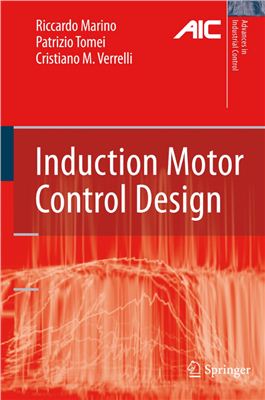Springer | 2010 | ISBN: 1849962839 | 351 pages
Nonlinear and Adaptive Control Design for Induction Motors is a unified exposition of the most important steps and conces in the design of estimation and control algorithms for induction motors. A single notation and mode nonlinear control terminology is used to make the book accessible to readers who are not experts in electric motors at the same time as giving a more theoretical control viewpoint to those who are. In order to increase readability, the book concentrates on the induction motor, eschewing the much more complex and less-well-understood control of asynchronous motors. The concepts of stability and nonlinear control theory are presented in appendices.
Important features of the book include: thorough coverage of speed sensorless control, important for applications; a wide-ranging discussion of nonlinear adaptive controls containing parameter estimation algorithms; coverage of the design of adaptive observers and parameter estimators which can complement state feedback design techniques; comparative simulations of different control algorithms on the same motor to clarify the advantages and drawbacks of each. The content is organized in a pedagogical, progressive exposition starting from basic assumptions, structural properties, modelling, state feedback control and estimation algorithms, and moving on to more complex output feedback control algorithms and modelling for speed sensorless control. Adaptive output feedback controls are based on stator current measurements, both alone and in connection with rotor speed. The induction motor exhibits many typical and unavoidable nonlinear features and so the material presented in this volume will be of value to engineers engaged in the control of electric motors and to a broader audience interested in nonlinear control design.
Nonlinear and Adaptive Control Design for Induction Motors is a unified exposition of the most important steps and conces in the design of estimation and control algorithms for induction motors. A single notation and mode nonlinear control terminology is used to make the book accessible to readers who are not experts in electric motors at the same time as giving a more theoretical control viewpoint to those who are. In order to increase readability, the book concentrates on the induction motor, eschewing the much more complex and less-well-understood control of asynchronous motors. The concepts of stability and nonlinear control theory are presented in appendices.
Important features of the book include: thorough coverage of speed sensorless control, important for applications; a wide-ranging discussion of nonlinear adaptive controls containing parameter estimation algorithms; coverage of the design of adaptive observers and parameter estimators which can complement state feedback design techniques; comparative simulations of different control algorithms on the same motor to clarify the advantages and drawbacks of each. The content is organized in a pedagogical, progressive exposition starting from basic assumptions, structural properties, modelling, state feedback control and estimation algorithms, and moving on to more complex output feedback control algorithms and modelling for speed sensorless control. Adaptive output feedback controls are based on stator current measurements, both alone and in connection with rotor speed. The induction motor exhibits many typical and unavoidable nonlinear features and so the material presented in this volume will be of value to engineers engaged in the control of electric motors and to a broader audience interested in nonlinear control design.

